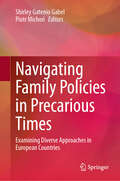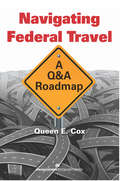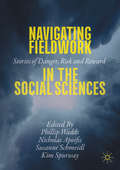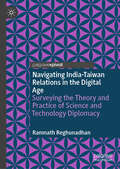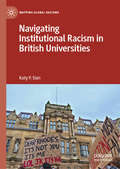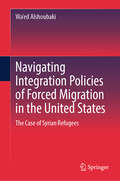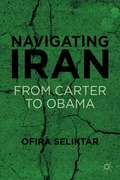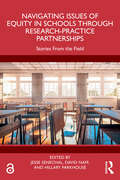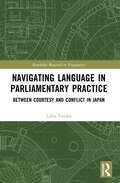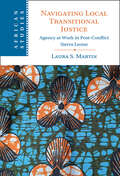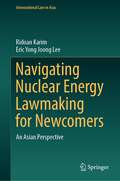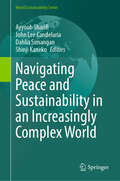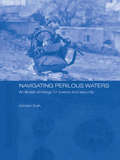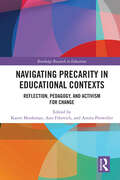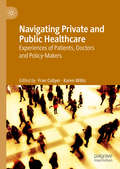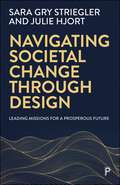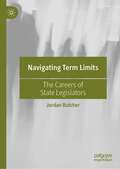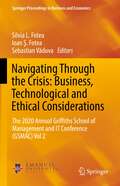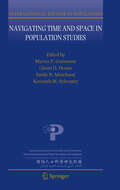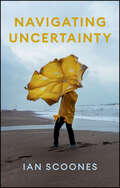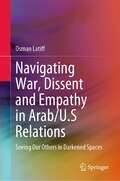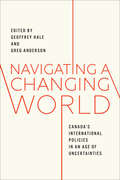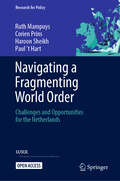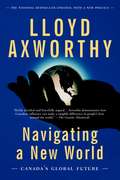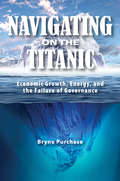- Table View
- List View
Navigating Family Policies in Precarious Times: Examining Diverse Approaches in European Countries
by Shirley Gatenio Gabel Piotr MichońThis book critically analyzes how European countries manage family-related challenges as they grapple with social and political transformations. It contributes to our understanding of contemporary family issues and serves as a bridge between academic analysis and practical policymaking. In an era marked by dynamic and precarious societal shifts, evolving family structures, and intricate policy landscapes, the imperative to comprehensively examine family life, social risks, and policies becomes increasingly apparent. This contributed volume delves into how changes in family and gender roles, work, and household composition have affected the intricacies of parental leave policies, societal attitudes, and the inherent precarity within family life. The chapters, composed by esteemed authors, provide both a national and a cross-national perspective, offering invaluable insights into the diverse ways families and states navigate the complexities of contemporary society, highlighting the unaddressed vulnerabilities created by existing public policies. The contents explore the nexus of changes in family, policy, and welfare state responsibilities with a focus on: Parental Leave Policies and Effects Lone Parenthood The Effects of Family Policy on Entering and Exiting the Labor Force Changing Attitudes Around Gender Roles and Policy Navigating Family Policies in Precarious Times guides readers through the complex interplay of familial experiences, social risks, and the multifaceted landscape of family policies across Europe. The book is an indispensable resource for examining policies and challenges encountered by contemporary families for policymakers, scholars, and practitioners. Its focus on Eastern European countries makes it a particularly relevant and engaging resource for students and educators interested in social policy and the complexities of family life in this region. With an interdisciplinary approach to a growing social issue, the book is a valuable resource for researchers in sociology, social work, economics, psychology and political science. It also can be used as a text in undergraduate and graduate courses on family such as Family Studies, Human Behavior & Social Environment, and Social and/or Family Policy courses.
Navigating Federal Travel: A Q&A Roadmap
by Queen E. CoxGet the right directions for federal travel!Don't get lost in the tangled web of rules and regulations governing federal travel. Make sure you have the one guide that will put you on the road to being a knowledgeable and compliant government traveler— Navigating Federal Travel: A Q & A Roadmap.This essential reference is geared not only to government travelers and those authorizing and approving travel, but also to those who provide travel management services to government agencies. The guide is organized in question-and-answer format, similar to the Federal Travel Regulation (FTR), and is presented to be readily accessible and informative.The information is based on the author's years of experience as a federal travel manager as well as the FTR, Government Accountability Office and Civilian Board of Contract Appeals decisions, and pertinent legislation and mandates. As a supplement to the FTR, the guide includes examples of actual and potential situations the traveler may encounter before, during, and after approval of authorized travel.The book offers clear and concise information on:• How to determine the need for travel• How travel is authorized and by whom• How the employee pays for expenses incurred in performing official travel• How the employee is reimbursed for authorized travel and travel-related expenses.Navigating Federal Travel also includes coverage of best practices for the Agency/Organization Program Coordinator (A/OPC), who is responsible for managing the government travel charge card program. Appendices offer helpful websites and resources as well as special information for relocation.Get the right directions and follow the rules with Navigating Federal Travel: A Q & A Roadmap.
Navigating Fieldwork in the Social Sciences: Stories of Danger, Risk and Reward
by Nicholas Apoifis Susanne Schmeidl Phillip Wadds Kim SpurwayThis edited collection of first-person stories about risk in the field offers an arsenal of practical examples where fieldworkers have attempted to negotiate the complexities and risks of field research. Field research can be a risky and dangerous journey where the line between safety and danger can be crossed in quick time, often with little warning. These risks manifest in diverse and novel ways. They can be physical and psychological, ephemeral and enduring. They can impact the researchers, participants, collaborators and interviewees. Indeed, they can condition the very foundation of our processes of knowledge production. Fieldwork is no small stakes game. Covering research from Afghanistan, Chad, DR Congo, Greece, the Horn of Africa, Iraq, Laos, Lebanon, Palestine, India, Indonesia, Mexico, The Netherlands, Vietnam and Australia, each chapter highlights diverse, eclectic, raw and vulnerable narratives about risks experienced before, during and after the conduct of this research. This book is of great value to inexperienced and experienced fieldworkers alike.
Navigating India-Taiwan Relations in the Digital Age: Surveying the Theory and Practice of Science and Technology Diplomacy
by Ramnath ReghunadhanIn the context of India-Taiwan relations, this book investigates the convergence of science, technology, and diplomacy (S&TD). It dives into the changing environment of digital breakthroughs and their influence on India-Taiwan bilateral collaboration. It explores existing problems, possibilities, and tactics involved in using science and technology (S&T) as major tools of diplomacy, with an emphasis on India-Taiwan diplomatic ties. The book primarily focuses on India-Taiwan bilateral ties in the framework of science, technology, and innovation (STI). It explores how these two nations navigate diplomatic channels and collaborate on scientific and technological initiatives in the digital age, focusing on case studies involving the semiconductor industry, health governance, and the adoption, competition, and diplomacy surrounding 5G technology. It sheds light on the hurdles that must be overcome, the geopolitical influences at work, and the possibilities for mutually beneficial relationships in this quickly changing scene. The book's scope also includes policy analysis, case studies, and future projections to provide a thorough picture of India-Taiwan ties in science and technology diplomacy (S&TD). The goal is to provide a comprehensive resource for policymakers, scholars, diplomats, and anyone else interested in the dynamics of science and technology diplomacy (S&TD) between Taiwan and India in the digital era.
Navigating Institutional Racism in British Universities (Mapping Global Racisms)
by Katy P. SianThis book critically examines the experiences of racism encountered by academics of colour working within British universities. Situated within a critical race theory and postcolonial feminist framework, Sian thoughtfully centres the voices of the interviewed academics, and draws upon her own experiences and reflections through a critical auto-ethnography. Navigating Institutional Racism in British Universities unpacks a range of complex and challenging questions, and engages with the way in which racial politics in the academy interplay and intersect with gender. The book presents a textured narrative around the various barriers facing academics of colour, and enhances understandings of experiences around institutional racism in British universities. Alongside its conceptual and empirical contribution, it develops a series of practical recommendations to encourage and facilitate the active participation of academics of colour in British universities.
Navigating Integration Policies of Forced Migration in the United States: The Case of Syrian Refugees
by Wa'ed AlshoubakiThis book investigates the integration of Syrian refugees in the United States, and it identifies the challenges that hinder their successful integration. After providing a comprehensive analysis of the U.S. legal instruments in national and international laws and obligations to receive forced migrants, the book then highlights the resettlement process and programs as a coordinated interagency process that entails a collaboration between the UN Refugee Agency and the related U.S. departments and agencies and the nongovernmental partners and refugee advocacy organizations. Moreover, it delves into integration as a proxy theory and governance that entails an analytical component from a theoretical lens to understand some aspects of realities that revolve around the resettlement of forced migrants' concepts, principles, and policies. Built on rich qualitative data from Syrian refugees in the U.S. to understand their resettlement experiences and their integration in multidimensional analysis, the book shows how the lack of federally driven integration policies and institutions in the U.S. negatively affects just integration. Relying on voluntary organizations leads to uneven outcomes among forced migrants, affecting social equity. Alongside this book's theoretical and practical implications, it highlights the ethical consideration of studying forced migrants and the synergy between forced migrants' vulnerability and cultural sensitivity. Ultimately, the book discusses the roadmap for implementing integration policies in the U.S. Among the topics covered: Introduction: The History of Managing Forced Migration in the U.S.: Political Climate and Global Events The U.S. Legal and Institutional Frameworks of the Resettlement of Syrian Refugees The Syrian Refugees' Integration Challenges in the U.S. and the Roadmap for Integration Policies Navigating Integration Policies of Forced Migration in the United States: The Case of Syrian Refugees is relevant reading for researchers who are interested in integration and refugee-related topics; academics who conduct research in social policies, refugee integration, and resettlement; public policymakers who are involved in formulating refugee integration policies; practitioners at various levels who assist resettled forced migrants; and graduate students studying political science, public administration, social work, and sociology. Politicians with left-wing views who are advocating for improved human security for everyone also would find the book a useful resource.
Navigating Iran: From Carter to Obama
by Ofira SeliktarThis book provides the first full account of America's relations with the Islamic Republic of Iran from Jimmy Carter's presidency to Barack Obama's. It discusses all major facets of Iranian policy of interest to the United States: nuclear proliferation, revolutionary export and support for international terrorism, efforts to undermine the Israeli-Palestinian peace process, and violations of human rights. It compares developments in Iran to their perception in Washington, providing the clearest picture available yet of the discrepancies between the complex and elusive Iranian reality and its understanding in the United States.
Navigating Issues of Equity in Schools Through Research-Practice Partnerships: Stories From the Field
by Jesse Senechal David Naff Hillary ParkhouseThis book provides a wealth of rich cases describing how research-practice partnerships (RPPs) in K-12 schools navigate equity in the design and implementation of their projects and shares insightful recommendations for both research-side and practice-side RPP leaders engaged in this work. Chapter authors from both researcher and practitioner communities unpack real examples that illustrate how RPPs conceptualized, conducted, and shared research related to prominent equity challenges in K-12 schools. Chapters also detail specific tensions and challenges – political, methodological, relational – and how to overcome these. Presenting an equity-focused RPP framework, this important volume explores how to cultivate trusting and equitable relationships among partners, prioritize humanity and equity in the identification and articulation of a RPP project topic, center equity goals, and align methodological approaches to equity objectives. This important resource helps aspiring, new, and veteran RRP leaders initiate projects or partner with new collaborators as they develop trusting relationships within university and school settings in order to conduct impactful, equity-oriented research.
Navigating Language in Parliamentary Practice: Between Courtesy and Conflict in Japan (Routledge Research in Pragmatics)
by Lidia TanakaTanaka explores the language used in Japanese parliamentary interactions to shed light on the use of language as a tool by politicians to convince, negotiate, persuade, as well as deliver aggression and criticism. By looking at the speech of politicians in the parliament of Japan, Tanaka demonstrates the unbreakable link between language and politics.Despite the association of Japan as a society in which linguistic politeness is paramount, Tanaka highlights the many examples of impoliteness in parliament and illustrates the idea that Japanese parliamentarians use language strategically to accomplish their political agenda. Analysis of questions and answers in committee meetings demonstrate that regardless of which party they belong to, those in opposition use the most antagonistic strategies. The book also shows the ways in which politicians deliver face-attacks and demonstrates that impoliteness can be delivered without insults or open aggression, using extremely polite language, honorifics, or sarcasm and irony.Lastly, the book also reveals that face-attacks are sent by members of both the government and opposition. As a book that explores the commonly overlooked phenomenon of impoliteness in Japan in the context of parliamentary interactions, it is a valuable resource for researchers and academics in the field of pragmatics and discourse analysis as well as a viable resource for undergraduate and graduate students.
Navigating Local Transitional Justice: Agency at Work in Post-Conflict Sierra Leone (African Studies #163)
by Laura S. MartinIn post-war Sierra Leone, a range of transitional justice mechanisms were implemented to address experiences of conflict, violence, and human rights violations. Much of the research on local transitional justice processes has focused on the work of organisations, failing to acknowledge how individual and communal dynamics shape and are shaped by these programs. Drawing on original fieldwork in Sierra Leone, Laura S. Martin moves beyond discussions measuring effectiveness and considers how people navigate their circumstances in conflict and post-conflict societies. Developing the idea of recognised and unrecognised transitional justice processes, Martin uses Fambul Tok as an example of a recognised local transitional justice program and shows how ordinary Sierra Leoneans appropriated Fambul Tok's agenda for their own purposes. Ultimately, this book highlights the crucial role of agency and the diverse range of actors involved in transitional justice processes. Justice, as Martin powerfully argues, is not something that happens to or for people, but is enacted by individuals and communities.
Navigating Nuclear Energy Lawmaking for Newcomers: An Asian Perspective (International Law in Asia)
by Eric Yong Lee Ridoan KarimThis book provides a comprehensive overview of the legal and regulatory framework for the nuclear industry from an Asian perspective. It includes information on the history of nuclear lawmaking, the key international treaties and agreements that govern the use of nuclear energy, the role of national and regional regulatory bodies, and the legal and policy issues that arise in the development and operation of nuclear power plants. The book also covers topics such as nuclear safety, security, waste management, environmental protection, and liability for nuclear accidents. Additionally, it provides insights into the legislative process and the various stakeholders involved in nuclear lawmaking, such as industry, government, and civil society organizations. The overall goal of this book is to provide a detailed and up-to-date understanding of the legal and regulatory framework for the nuclear newcomers, particularly in Asia, and to help readers navigate this complex and dynamic field.The book is also used as a guide for all nuclear energy-producing countries, lawmakers, students, researchers, or even for general readers to understand the perspectives of international nuclear energy law.
Navigating Peace and Sustainability in an Increasingly Complex World (World Sustainability Series)
by Shinji Kaneko Ayyoob Sharifi Dahlia Simangan John Lee CandelariaThis book, a sequel to a well-received book titled “Bridging Peace and Sustainability Amidst Global Transformations,” delves deeper into the entwined roots of peace and sustainability and emphasizes their interdependence. How are peace and sustainability interconnected, and what key factors define the relationship between them? These questions were examined at the NERPS 2024 conference in Hiroshima and are central to our narrative. In this book, we explore the synergy of peace and sustainability through theoretical frameworks and real-world examples.We recognize that while the 2030 Agenda for Sustainable Development has acknowledged the link between peace and sustainability, a significant gap remains. Too often, efforts to promote peace and sustainability run parallel, never intertwining, losing the chance to bolster each other. We argue for merging the peace and sustainability agendas to confront contemporary challenges, calling for action to enhance and take advantage of their mutual reinforcement. Through diverse perspectives, this collection illuminates the social, economic, and environmental dimensions of this nexus, serving as a guide for policymakers, a reference for researchers, and a catalyst for dialogue among sectors committed to achieving the Sustainable Development Goals.
Navigating Perilous Waters: An Israeli Strategy for Peace and Security (Israeli History, Politics and Society)
by Ephraim SnehIsrael is a Jewish state in a Muslim Middle East. How can it survive in that region? This book answers this question by analyzing the dangers and threats that Israel faces today. The book also highlights an important component of Israel's strength: the endurance and the cohesion of its social fabric, which the author sees as the key to his country's survival in the Middle East. Written by Israel's former deputy minister of defence, this book is essential reading for all those interested in the contemporary politics of the Middle East.
Navigating Precarity in Educational Contexts: Reflection, Pedagogy, and Activism for Change (Routledge Research in Education)
by Karen Monkman Ann Frkovich Amira ProwellerThis volume offers a timely collection of research-based studies that engage with contemporary conditions of precarity across an array of locations, exploring how it is understood, experienced, and acted upon by educators in schools, universities, and nonformal educational spaces. Precarity presents as layered, unpredictable, destabilizing, and rapidly shifting socio-political and economic dynamics, shown here in various forms, including the global pandemic, divisive populist politics, displacement of refugees and the landless, race and gender injustices, and neoliberal policies that constrain educational and social possibilities. Grouped around reflection, educational practice, and social activism, the authors show how educators engage these precarious conditions as they work toward a more interconnected, humane, and just society. This text will benefit researchers, academics, and educators with an interest in social foundations of education, multicultural and social justice education, educational policy, and international and comparative education, sociology and anthropology of education, and cultural studies within education, among other fields.
Navigating Private and Public Healthcare: Experiences of Patients, Doctors and Policy-Makers
by Fran Collyer Karen WillisThis edited collection focuses on the global growth of privatisation and private sector medicine in both developed and lesser developed countries, and the impact of this on patients, health workers, managers and policy-makers. Drawing upon sociological theories, concepts and insights, as well as experts from several countries with extensive experience in researching the field either nationally or internationally, the collection offers a unique perspective on healthcare services and healthcare systems: a view from those trying to access healthcare services, working inside health systems, or responsible for managing and organising services. Collectively, the chapters contribute an international perspective on the navigation of healthcare systems, and addresses the growing salience of ‘choice’ between public and private medicine in a variety of different national systems and contexts.
Navigating Societal Change through Design: Leading Missions for a Prosperous Future
by Sara Gry Striegler Julie HjortThe social and environmental challenges we face today are complex and interdependent. Leaders and experts worldwide acknowledge that we cannot address them in isolation and that to keep doing so is to intensify the problem. This book connects the dots between a group of diverse, but overlapping, professional domains: design, mission-oriented innovation, foresight and futures design, system innovation and leadership. The authors mix methodology and theory with real-life case studies and compelling visual models to aid readers in navigating a new story, balancing tensions in time scale and mindset, learning through experiments and working collaboratively. Aimed at policy makers, practitioners and educators, this book encourages a new and heightened awareness of systemic change that can lead to societal transformation in support of a sustainable future.
Navigating Term Limits: The Careers of State Legislators
by Jordan ButcherThis book considers whether term limits help curb careerism in the US state legislatures. Term limits are popular among the public and have been overwhelmingly successful once on the ballot. Despite this, very little is known about the long-term effects of these institutional rules. If term limits were sold to the public to remove entrenched incumbents from office, how do they alter the careers of legislators and what are the implications? Butcher suggests that term limits do not end careers but instead, lawmakers have become more creative in their pursuits. She finds that the presence of term limits has created an new career system unique to those states that have limits. In each chapter, there is a quantitative analysis, followed by qualitative interviews to better understand the underlying motivations of members.
Navigating Through the Crisis: The 2020 Annual Griffiths School of Management and IT Conference (GSMAC) Vol 2 (Springer Proceedings in Business and Economics)
by Sebastian Văduva Ioan Ş. Fotea Silvia L. FoteaThis proceedings volume provides a multifaceted perspective on the unprecedented crises generated by the global COVID-19 pandemic, and its ramifications for individuals, businesses, organizations, governments and systems in developing countries. Featuring selected papers from the 2020 Annual Griffiths School of Management and IT Conference (GSMAC), held in Oradea, Romania, this volume focuses on business, technological and ethical considerations in the process of navigating through a global crisis. It analyzes the effectiveness of different measures taken at individual, organizational and country level and outlines potential scenarios and solutions for the new post-crisis reality. Finally, the book provides diagnosis and recommendations for managerial practice in various industries impacted.
Navigating Time and Space in Population Studies
by Emily R Merchant Glenn D Deane Kenneth M Sylvester Myron P GutmannNavigating Time and Space in Population Studies presents innovative approaches to long-standing questions about the diffusion of population and demographic behavior across space and over time. This collection utilizes newly-available historical data along with spatially and temporally explicit analytical methods to evaluate and refine core demographic theories and to pose new questions about mortality and fertility transitions, migration, urbanization, and social inequality. It adds a spatial dimension to the analysis of temporal processes and a temporal element to spatial processes. Chapters cover a broad range of geographical settings, including the United States, Europe, Latin America, and the Islamic world, and span time periods from the eighteenth to twentieth century. Contributors from a variety of disciplines reveal the complexity of factors involved in population processes that spread across space and unfold over time, and demonstrate a rich set of tools with which to explore, analyze, and test the spatial and temporal dynamics of these phenomena. The theories, methods, and substantive findings presented here provide new lenses through which to view time and space in population studies, offering useful models and valuable insights to demographers and other social scientists exploring both historical and contemporary questions about population dynamics anywhere in the world.
Navigating Uncertainty: Radical Rethinking for a Turbulent World
by Ian ScoonesUncertainties are everywhere. Whether it’s climate change, financial volatility, pandemic outbreaks or new technologies, we don’t know what the future will hold. For many contemporary challenges, navigating uncertainty – where we cannot predict what may happen – is essential and, as the book explores, this is much more than just managing risk. But how is this done, and what can we learn from different contexts about responding to and living with uncertainty? Indeed, what might it mean to live from uncertainty?Drawing on experiences from across the world, the chapters in this book explore finance and banking, technology regulation, critical infrastructures, pandemics, natural disasters and climate change. Each chapter contrasts an approach centred on risk and control, where we assume we know about and can manage the future, with one that is more flexible, responding to uncertainty. The book argues that we need to adjust our modernist, controlling view and to develop new approaches, including some reclaimed and adapted from previous times or different cultures. This requires a radical rethinking of policies, institutions and practices for successfully navigating uncertainties in an increasingly turbulent world.
Navigating War, Dissent and Empathy in Arab/U.S Relations: Seeing Our Others in Darkened Spaces
by Osman LatiffThis book focuses on American political discourse connected to war, dissent, and empathy. Through interdisciplinary methods of history, politics and media studies, the book examines ways in which American self-identity alters as a consequence of media portrayal of human suffering and of its existential others. It compares representations of the Iraq wars to earlier precedents and looks at the work of American activists, assessing how narratives and images of human suffering in new media iconography generate empathic attitudes towards others. This comparative, multimodal study helps to explain shifting self-identities within the U.S, and relationally through the representation of the Arab other presenting an original and historicised contribution to the media-war field of academic and public debate. The book underscores empathy as a vibrant category of analysis that expands how we think about West-Arab relations, revealing how understanding the cultural aspects of this conflictual interrelationship needs to be broadened.
Navigating a Changing World: Canada's International Policies in an Age of Uncertainties
by Geoffrey Hale, Greg AndersonThe negotiation of the Canada–United StatesU.S. Free Trade Aagreement in 1985–88 initiated a period of substantially increased North American, and later, global, economic integration. However, events since the election of Donald Trump in 2016 have created the potential for major policy shifts arising from NAFTA’s renegotiation and from continuing political uncertainties in the United States and with Canada’s other major trading partners. Navigating a Changing World draws together scholars from both countries to examine Canada–U.S. policy relations, the evolution of various processes for regulating market and human movements across national borders, and the specific application of these dynamics to a cross-section of policy fields with significant implications for Canadian public policy. This bookIt explores the interaction impact of territorial institutions and extra-territorial forces – institutional, economic, and technological, among others – on interactions across national borders, both within North America and, where relevant, in broader economic relationships affecting the movement of goods, services, people, and capital. Above all, Navigating a Changing World represents the first major study to address Canada’s international policy relations within and beyond North America since the elections of Justin Trudeau in 2015 and Donald Trump in 2016 and the renegotiation of NAFTA.
Navigating a Fragmenting World Order: Challenges and Opportunities for the Netherlands (Research for Policy)
by Paul 't Hart Corien Prins Haroon Sheikh Ruth MampuysThis open access book provides a unique and incisive analysis of the shifting dynamics in the international order, exploring a threefold fragmentation—of power centres, geopolitical arenas, and global worldviews. Through the lens of a carefully developed triad framework—focusing on security, prosperity, and values—it equips policymakers with an instrument to navigate the complex and often difficult trade-offs that arise in a world characterized by multipolarisation. While the erosion of the international order is often seen as a challenge from a Western perspective, this book also acknowledges why actors in other regions may perceive it as an opportunity to expand their influence on the global stage. The authors, all affiliated with the Netherlands Scientific Council for Government Policy (WRR), provide a nuanced assessment of these evolving power shifts and conclude with actionable policy recommendations for effectively engaging with the multipolar world—both by mitigating risks and by seizing new opportunities for cooperation and alliance-building. Essential reading for policymakers in the EU and its member states, this book is equally relevant to scholars, students, and anyone with a keen interest in international relations and global governance.
Navigating a New World: Canada's Global Future
by Lloyd AxworthyIn Navigating a New World Lloyd Axworthy charts how we can become active citizens in the demanding world of the twenty-first century, to make it safer, more sustainable and more humane. Throughout he emphasizes the human story. As we meet refugees from civil war and drought, child soldiers and landmine victims, the moral imperative is clear: this is a deeply compassionate appeal to confront poverty, war and environmental disaster.Before Lloyd Axworthy entered global politics, "human security" -- a philosophy calling for global responsibility to the interests of individuals rather than to the interests of the nation state or multi-national corporations -- was a controversial and unfamiliar idea. When put into action, human security led to an international ban on landmines, initiatives to curtail the use of child soldiers, and the formation of the International Criminal Court. Today, with conflict raging across the planet -- and building -- the need for a humane, secure international governance is more vital than ever. So how can Canada reject a world model dominated by U.S. policy, military force and naked self-interest? How can we rethink a global world from the perspective of people -- our security, our needs, our promise, our dreams?Lloyd Axworthy delivers recommendations that are both practical and radical, ranging from staunch Canadian independence from the U.S. to environmental as well as political security; from rules to govern intervention when nations oppress their own citizens, to codes of conduct on arms control and war crimes.Arresting and provocative, Navigating a New World lays out just why Canada has the skills to lead the world into a twenty-first century less nightmarish than the last, and help make the world safer and more just for us all. This is a call for action from one of Canada's most eloquent statesmen and thinkers, and is essential reading for all Canadians.Where is the line we draw in setting out the boundaries for being responsible for others? Is it simply family and close friends? Do we stop at the frontiers of our own country? Does our conscience, our sense of right or wrong, take us as far as the crowded camps of northern Uganda, surrounded by land mines, attacked repeatedly by an army made largely of child soldiers? I believe we in Canada have a special vocation to help in the building of a more secure order. We need not be confined to our self-interest. -- from Navigating a New WorldFrom the Hardcover edition.
Navigating on the Titanic
by Bryne PurchaseNavigating the Titanic outlines the brief history of economic growth and the private and public institutions - markets, corporations, households, and governments - which underpin that growth. Bryne Purchase examines mega-risks related to our economy's use of fossil fuels and specifically looks at resource depletion, energy security, and climate change - all "mega-risks" because they are both global in scope and potentially existential in impact. Focusing on North America, with a particular emphasis on the United States, Purchase's central argument is that the institutions which have produced spectacular economic growth are not capable of acting with prudence to deal with these mega-risks before they become a real danger. He identifies certain institutional design flaws that, while underwriting economic growth, leave society open to potentially catastrophic failure and reveals how these design flaws have been compounded by the stresses of the growing income inequality in society.
